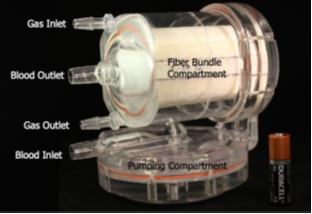ModELAS: A Modular Extracorporeal Lung Assist System
University of Pittsburgh researchers have developed a wearable artificial lung. The device, the Modular Extracorporeal Lung Assist System (ModELAS) is designed to provide long-term respiratory support to both adult and pediatric patients. ModELAS could be an alternative to mechanical ventilation (MV), extracorporeal membrane oxygenation (ECMO), and extracorporeal carbon dioxide removal (ECCO2R) in conscious patients allowing for increased mobility, improved quality of life, and reduced risk of ventilator-induced lung injury.

Description
Lung disease remains a major cause of death in the US. MV and ECMO are commonly used to treat severe lung failure in both adult and pediatric patients. However, MV and ECMO both restrict patient mobility limiting the ability to engage in physical therapy (PT) leading to muscle loss, with a negative impact on quality of life and long-term recovery. There is a pressing clinical need to develop portable devices to act as extracorporeal artificial lungs for long term use in conscious patients with lung disease. ModELAS is a wearable device suitable for long-term respiratory support. ModELAS incorporates a blood pump and gas exchange module and can successfully oxygenate blood and remove CO2. ModELAS is adaptable and suitable for both adult and pediatric patients.Applications
• Lung failure• Pre- and post-lung transplant care
• Acute respiratory distress syndrome
Advantages
In addition to restricting a patient’s mobility, long-term use of MV can exacerbate lung injuries. This risk of injury means MV is not a suitable bridge while awaiting lung transplant and hundreds of Americans die each year waiting for suitable lungs.ModELAS is designed to provide respiratory support to both adults and pediatric patients. ModELAS is highly compact and can be easily worn by an ambulatory patient or transported in a wheeled case, allowing patients to maintain mobility and attend PT, vital to recovery. ModELAS provides extracorporeal support removing the risk of ventilation injuries and could be a bridge to support patients waiting for a lung transplant. The design also includes a densely packed hollow fiber membrane bundle as a filter, which ensures gas exchange and reduces the generation of thrombi in the ModELAS.
Invention Readiness
A ModELAS device was developed. Animal testing confirmed ModELAS, connected via a dual-lumen cannula in the jugular vein, was well tolerated and could successfully provide respiratory support for 30 days. Work is ongoing to develop a tip-to-tip zwitterionic surface coating to improve hemocompatibility and reduce the risk of thrombi formation within the device.IP Status
https://patents.google.com/patent/US20250144282A1Related Publication(s)
Orizondo, R. A., Omecinski, K. S., May, A. G., Dhamotharan, V., Frankowski, B. J., Burgreen, G. W., Ye, S. H., Kocyildirim, E., Sanchez, P. G., D'Cunha, J., Wagner, W. R., & Federspiel, W. J. (2021). Month-long Respiratory Support by a Wearable Pumping Artificial Lung in an Ovine Model. Transplantation, 105(5), 999–1007. https://doi.org/10.1097/TP.0000000000003481
May, A. G., Orizondo, R. A., Frankowski, B. J., Ye, S. H., Kocyildirim, E., Wagner, W. R., D'Cunha, J., & Federspiel, W. J. (2020). In vivo testing of the low-flow CO2 removal application of a compact, platform respiratory device. Intensive care medicine experimental, 8(1), 45. https://doi.org/10.1186/s40635-020-00329-9
May, A. G., Orizondo, R. A., Frankowski, B. J., Wearden, P. D., & Federspiel, W. J. (2019). Acute In Vivo Evaluation of the Pittsburgh Pediatric Ambulatory Lung. ASAIO journal (American Society for Artificial Internal Organs : 1992), 65(4), 395–400. https://doi.org/10.1097/MAT.0000000000000918
